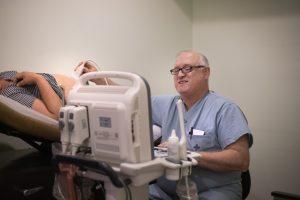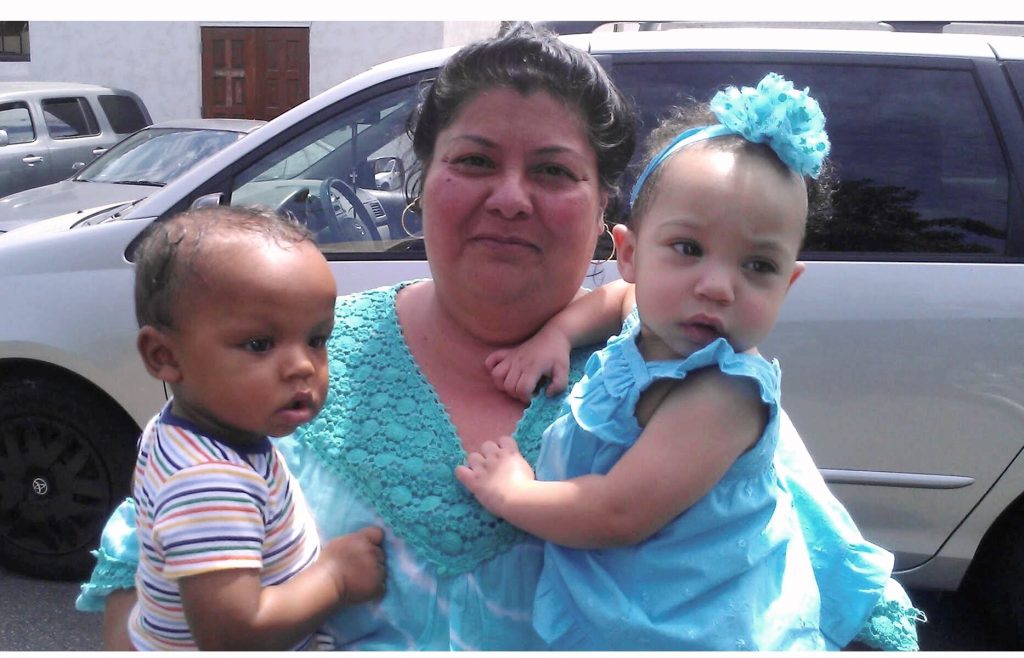It is a cool autumn morning, and Cecilia Chavez is standing where she has stood most weekday mornings for the last 12 years: in front of an abortion clinic. Brochures in hand, and her scapular around her neck, she knows the women entering the building do not want to see her, much less speak with her.
“Good morning,” Chavez said as a woman approached. “Are you here because you are pregnant?”
The woman turns to look at Chavez, whose dark hair is beginning to silver around her gentle, round face. Chavez offers her a brochure, then quietly asks if she is planning to have an abortion. It is an intense, intimate exchange. The woman shares her story, and Chavez nods, offers encouragement, and gives the woman her phone number.
When, and if, she calls, Chavez will be ready with whatever she may need: medical care, a sonogram, diapers, baby clothes, a maternity home, groceries, agency resources, adoption information, a listening ear. Friendship.
Incredibly, hundreds of women have taken Chavez up on her offer. Even more incredible: 1,338 babies’ lives have been saved, and counting. “We had another save today,” Chavez shared in a recent text message. “Mother of three. She said she was hoping someone would tell her not to do it … thank you God.”
Five days later: “The twins were born this weekend! Seven pounds each. Mother and babies are doing well.”
Known as the Expectant Mothers Outreach, the apostolate, as it is described, originated at Church of the Holy Innocents in Long Beach.
It was a pro-life homily from the parish’s pastor, Father Peter Irving, that launched Chavez and a handful of other parishioners into action in 2008.
“I wanted to be more than a ‘Sunday Catholic,’ ” Chavez recalled. “I was looking for where God needed me to be.” When Irving invited members of the congregation to pray in front of a local abortion clinic, Cecilia showed up. “I became pro-life. I became a believer,” she recalled. “And I’m still there.”
What began as praying the rosary evolved into a critical lifeline for women who did not necessarily want an abortion, but felt they had no choice. “We weren’t protestors, we weren’t there to judge,” Chavez said. “We wanted to offer other options, give them real help and hope.”
On her first day of actively “reaching out,” Chavez persuaded a mother not to abort her twins. “It was emotional,” she recalled.
Today, Chavez works out of a small office with an unmarked door. In this refuge for pregnant women in crisis, she has encountered every possible scenario through the years: broken relationships, abusive partners, teen pregnancy, poverty, rape.
“Every mother is different, and we meet them where they are,” said Chavez, who journeys with the mothers not only through birth, but well into childhood. Two weeks ago, she received a text from a mother whose daughter was turning six.
“I cried a little bit today,” it read. “If it wasn’t for you I would’ve done the biggest mistake of my life walking into the abortion clinic. I’m really glad God put you in my path. Thank you, Cecilia. It means so much to me. It really does.”
One of the most crucial aspects of Chavez’s work is her partnership with OB/GYN Dr. Patrick Baggot, a board-certified maternal-fetal specialist who has worked with Irving for many years.
Baggot provides free exams, ultrasounds, tests, and medical care to women in crisis pregnancies. Along with helping women through the outreach, he owns and operates Guadalupe Medical Center in downtown Los Angeles, a pro-life pregnancy clinic.
Baggot is especially passionate about giving second opinions regarding ectopic pregnancies, birth defects, and other medical issues that might lead women to consider abortion. His second opinions have saved hundreds of lives.

“There’s a tendency sometimes for doctors to overcall diagnoses,” he explained. “I saw a patient today who was told her baby has spina bifida, and she doesn’t.” Baggot believes doctors “are really trying to do a good job. But their concept of doing a good job is to provide an abortion to people that they think need one.”
Originally, he said, maternal-fetal medicine was intended to help the baby. “But the abortion industry has had its effect on the field, so more and more, its purpose is to get rid of the babies.”
A relatively new medical development is having a positive impact on Baggot’s lifesaving efforts: abortion pill (RU-486) reversal.
The medication, which is essentially progesterone, is safe for baby and mother. “We have had quite a few successful abortion reversals, and many of those babies are very strong and healthy,” he said.
He keeps the medicine on hand for patients to take immediately. “Time is of the essence,” he said. “The drug to kill the baby is already in the mother’s system, and we’re trying to get to it before it completes its effect.” Baggot oversees about 10% of the RU-486 reversals in the United States.
He makes a point of offer his second opinion to any woman who is considering abortion because she was told something is wrong with her baby. “I imagine there are many priests in Los Angeles who encounter pregnant women in distress because of test results,” he told Angelus. “I want them to know they can call me. I would be happy to help.”
This spirit of generosity is the same spirit that shines through Chavez, Irving, and all of those who support the Expectant Mothers Outreach.
As for Chavez, she and a few others associated with the Outreach will continue their mornings in front of the abortion clinic, eager to help those who are feeling isolated and afraid.
“We are there to offer hope for that one mother,” she said. “God is going to make a way. Watch.”
For more information about Expectant Mothers Outreach, please contact Cecilia Chavez (no relation to the author of this article) at 562-209-6987. Dr. Patrick Baggot can be reached at Guadalupe Medical Center at 213-386-2606.

